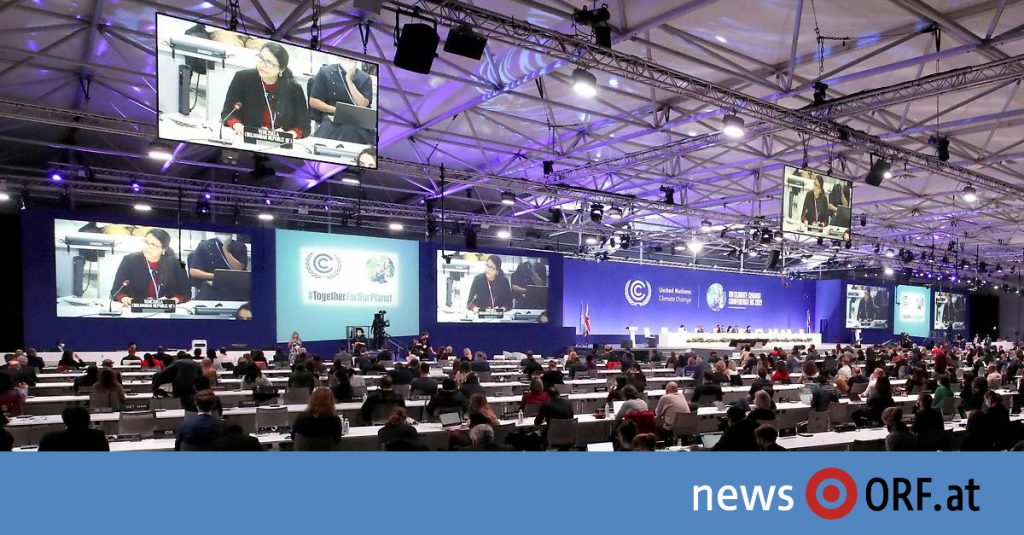Despite opposition from many countries, the latest draft of the final declaration of the World Climate Conference also includes a request for the first time in 25 years to get out of coal worldwide and eliminate at least “ineffective” subsidies for oil, gas and coal. The document was released on Saturday by the UK’s Presidency of the Glasgow Summit.
This should be discussed by the plenum of about 200 countries – a vote is scheduled for Saturday, but an additional extension is also possible. The global climate summit was supposed to end on Friday.
“Don’t ruin this moment”
In the afternoon, British Climate Change Conference President Alok Sharma called on delegates to agree on negotiating texts on Saturday. This is a “really moving things forward” package. It remains to be seen if this ends the negotiations soon.
In any case, the Vice-President of the European Union Commission, Frans Timmermans, was largely satisfied with the draft. This is the first time a call has been made to phase out the use of climate-damaging coal. This is a “beautiful historical thing”. He warned delegates of failing in the last few metres: “Don’t ruin this moment.”
There was no sign of agreement that evening. Some indicated support, even if they did not agree to everything in the draft. Other countries, including India, South Africa and Nigeria, do not want to move forward with phasing out coal so quickly. The use of the veto by these countries will prolong the summit.
45 percent less greenhouse gases by 2030
In any case, the demand that all countries fine-tune their national climate plans by the end of 2022 – voluntarily. So far, however, plans submitted to the United Nations are far from sufficient to meet the 2015 Paris climate goals. These aim to hold global warming at 1.5 degrees compared to pre-industrial times. The declaration states that for this to happen, global emissions of climate-damaging greenhouse gases must fall by 45 percent this decade.
Climate Summit in Extension
The United Nations Climate Summit has been extended in Glasgow, Scotland. At the summit, the path should be set to slow global warming significantly.
No specific amounts mentioned
For the first time, the long-standing appeal to poor countries to create a pot of money to help in the event of damage and losses is being accepted. This refers to destruction or forced resettlement after droughts, storms or hurricanes that increase as a result of global warming. Countries are required to pay cash for it. Tangible amounts for this are not mentioned in the new draft either. It is doubtful whether many poor countries will be satisfied with this, the population of which is already severely affected by the climate crisis. In the new negotiating text of the British Presidency of the COP, reference was made only to the “urgent need to expand measures and support” for countries particularly at risk.
All past years conferences have been extended through the weekend. At the end of the massive meeting with about 40,000 delegates, about 200 states have to pass the final text unanimously.
Environment Minister Leonor Gosler (Greens) said the new designs “have a lot of light and little shadows. The 1.5-degree target is clearly firm, and there is a robust process to improve national climate plans early next year. Coal phase-out and funding will be found.” For inefficient fossil fuels for the first time in the final COP decision. Of course we would have liked more clear wording, but we also have to admit that this is a breakthrough.”
“outright betrayal”
Some climate stewards saw it differently. They accused the industrialized countries of leaving the poor countries alone. “The latest draft of the final declaration is a clear betrayal of the rich nations – the USA, the EU and Great Britain,” Tasnim Esop, chair of the Climate Action Network, criticized on Saturday in Glasgow. They refused to pay for any damage and loss they had caused. So they lost any solidarity and sense of responsibility.
The Nature Conservancy WWF struck a more positive balance. The talks put the world “in a better position than ever before in terms of political action”. Thanks to continued pressure, the goal is now politically well-established to stop global warming at 1.5 degrees – and not just at “well below 2 degrees”. In the meantime, there is scientific consensus that more than 1.5 degrees will have serious consequences.

“Food practitioner. Bacon guru. Infuriatingly humble zombie enthusiast. Total student.”








More Stories
Kyiv: Russian Kursk offensive halted
US Presidential Election: Former US Government Officials Warn Against Donald Trump's Election
Netherlands wants to leave asylum system